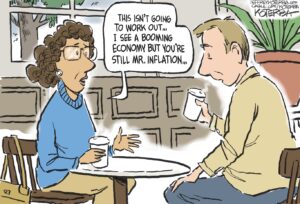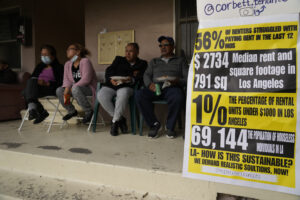Bush’s Gas Gaffe
Of all the reasons to be hopping mad, helplessly shaking your head or hoping beyond reasonable hope that somehow the Bush presidency will get better before it ends, blaming the president for failure to know the price of gas at the pump isn't one of them.WASHINGTON — Of all the reasons to be hopping mad, helplessly shaking your head or hoping beyond reasonable hope that somehow the Bush presidency will get better before it ends, blaming the president for failure to know the price of gas at the pump isn’t one of them.
Blaming President Bush for failing to implement anything close to a rational economic policy — dithering as the American economy sinks toward crisis — is.
You have to feel a bit sorry for Bush. At his news conference last week, the president revealed that he had no idea that some analysts are projecting that gas prices will soon hit $4 a gallon. “That’s interesting,” the president mused aloud. “I hadn’t heard that.”
Now, reporters always get excited when a politician doesn’t know the price of gas (or milk, or bread, or eggs — you get the picture). Such lapses inevitably become metaphors for out-of-touch politicians who don’t give a hoot for the everyday struggles of average people. But really, on this one, even I’m willing to give Bush a break. He hasn’t driven himself around for at least seven years and certainly doesn’t frequent the self-serve pumps to fill his own tank.
No, Bush’s gas-price gaffe is better seen as a speck on the broader canvas of the president’s detached approach to the economy. Generally, he believes that everything is hunky-dory so long as he can point to his tax cuts as an all-purpose panacea. He did it again at the very same news conference where he seemed to be mystified by $4-a-gallon gas: “If you’re out there wondering whether or not — you know, what your life is going to be like and you’re looking at $4 a gallon, that’s uncertain,” Bush said. “And when you couple that with the idea that their taxes may be going up in a couple of years, that’s double uncertainty. And therefore, one way to deal with uncertainty is for Congress to make the tax cuts permanent.”
Got that?
Tax cuts that do not expire for two years, and which overwhelmingly flow toward those who are most able to afford expensive gas, are supposed to provide some kind of economic lift now, if only Bush could win the ideological fight over them with the Democratic Congress.
Meanwhile, the subprime mortgage mess is transforming itself into what amounts to an overall credit crunch; even state and municipal governments are now having more difficulty borrowing. The dollar has fallen so much that at this point, its weakness is contributing in part to the recent run-up on international oil prices as speculators look to oil as a safer place to put their money. Wages, stagnant through nearly all of Bush’s tenure, have long since stopped keeping pace with the costs of such necessities as energy, health insurance and food.
The financial pages warn almost daily of an economy that may be downshifting into a real crisis. But if past performance is to be a guide, Bush himself won’t go into crisis mode until it is way too late. His White House all but ignored the threats of a looming terrorist attack in the months before 9/11. The president’s response to the urgent entreaties from weather forecasters that a killer storm of potentially historic proportion was approaching the Gulf Coast was a shrug — and even after Katrina hit, Bush seemed to be clueless about the depth of devastation and human suffering.
Terrorists and hurricanes strike quickly. Not so economic catastrophes that are months in the making, are foretold with reams of data from private markets and the government, and can even be seen in such prosaic symbols as the proliferation of foreclosure and auction signs along the roadways.
The economic stimulus package the White House and Congress already agreed upon is fine as far as it goes. Millions of Americans who receive quick tax rebates undoubtedly will spend at least some money in ways that prop up the economy. But for at least seven years, the evidence of structural problems in the economy — wage stagnation and the rapid erosion of worker benefits such as health insurance and pension coverage — has been on full view.
I don’t really want Bush driving around to gas stations or grocery stores just so that he can always have a ready answer to what-is-the-price-of questions. I want him to finally show he’s ready for the next crisis — the broad economic crisis — that is brewing on his watch.
Marie Cocco’s e-mail address is mariecocco(at)washpost.com.
© 2008, Washington Post Writers Group
Your support matters…Independent journalism is under threat and overshadowed by heavily funded mainstream media.
You can help level the playing field. Become a member.
Your tax-deductible contribution keeps us digging beneath the headlines to give you thought-provoking, investigative reporting and analysis that unearths what's really happening- without compromise.
Give today to support our courageous, independent journalists.






You need to be a supporter to comment.
There are currently no responses to this article.
Be the first to respond.